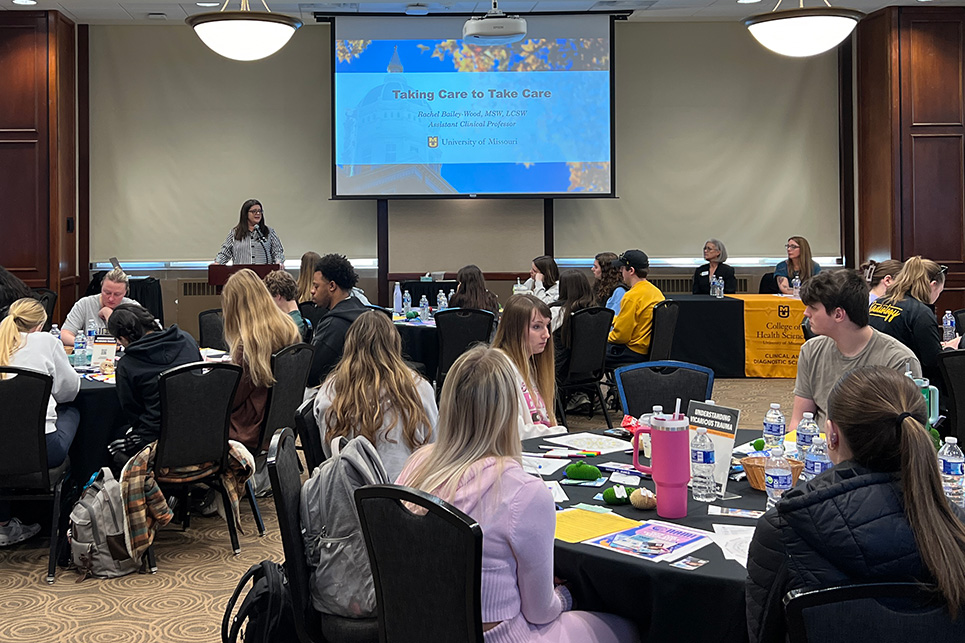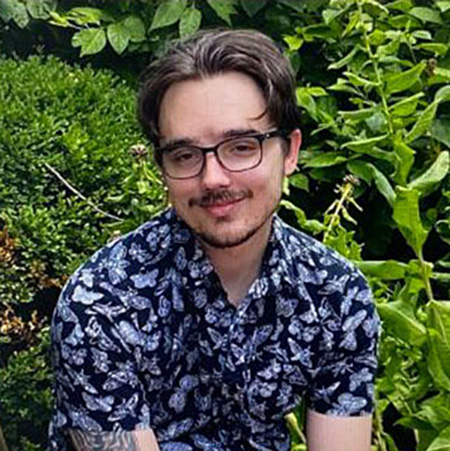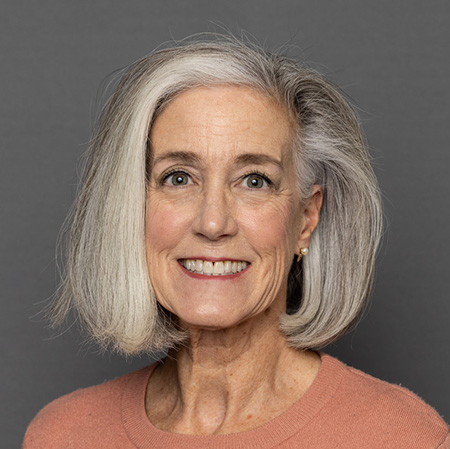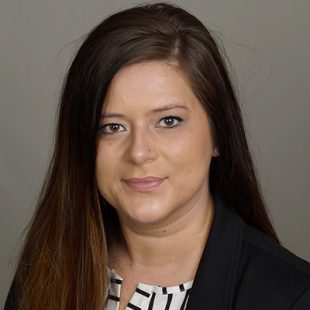News & Announcements
Breaking the silence on mental toll of health care
April 2, 2024
Story by Ryan Gauthier

It was July 2021. Nate Brady had just graduated with honors from the University of Missouri’s Nuclear Medicine program and was preparing to start the rest of his life. He had been offered a job as a nuclear medicine technician, and he aspired to someday become a radiation safety officer or attend medical school.
As he navigated this major life transition, Nate was dealing with an enormous amount of stress. That stress caused anxiety and created feelings of depression that he was reticent to admit, said his mom, Jayne Murphy. Struggling with anxiety and depression in secret and not trusting there were supportive resources, Nate died by suicide.
“My son suffered in silence — he did not share his burden with us,” Murphy said. “I wish he had told me or anyone what he was experiencing.”
Murphy was one of the featured speakers during a Department of Clinical and Diagnostic Sciences interprofessional education event on March 21. Students studying Clinical Laboratory Science, Diagnostic Medical Ultrasound, Nuclear Medicine, Radiography, and Respiratory Therapy gathered to discuss how experiences in their programs and clinical placements can impact their mental health. The event was sponsored by Burrell Behavioral Health, a system of community mental health centers.
Murphy spoke about the challenges Nate faced as he worked through school and clinicals, noting she wishes her son had known that it’s OK to not always feel OK — and how and where to seek help during those difficult times.
“You are never alone,” she said. “No matter how dark it may seem, there is always help. And the first step toward finding that help is reaching out and being honest about what’s going on inside.”
The mental toll of empathy
Individuals working in or near the health care space often must contend with vicarious trauma, a profound shift in how one sees the world due to the emotional toll of helping others through traumatic situations. While the process of extubating a patient who has been on mechanical ventilation for several weeks might seem relatively straightforward for a respiratory therapist, the realities of being involved in an end-of-life decision are far more difficult to navigate.
Rachel Bailey-Wood, an assistant clinical professor in the School of Social Work, said many health professionals contend with compassion fatigue — the physical and emotional erosion that takes place when a person is unable to return to baseline after interacting with patients.
“We have frequent exposure to trauma and suffering,” she said. “We have very long shifts. We have demanding schedules, high caseloads. All that leads to imbalance in our work life, our personal life, and well-being.”
Bailey-Wood explained there’s a heavy toll of sitting in a place of empathy for 40 to 80 hours every week, and she encouraged students to prioritize their physical and mental health. Health care workers have a much higher burnout rate than the general population, she said, and patient care eventually suffers when these feelings are left untreated or unacknowledged.

While the natural inclination is to survive the moment and shove down traumatic experiences in hopes those feelings will magically disappear, Bailey-Wood said the bill eventually becomes due. By finding healthy ways to process emotionally charged situations and leaning on mental health resources, she said students can destigmatize mental health struggles and become agents of change.
“I have certainly had therapy […] at various points in my career, and it was critical to be being able to keep going,” Bailey-Wood said. “Think critically about how you can take care of yourselves so that you can help take care of other people.”
Stopping the cycle
Kathy Myers, chair of the Department of Clinical and Diagnostic Sciences, encouraged students to alleviate some of their stress by applying for financial aid through the Nate Brady Memorial Student Support Fund. Grants from the fund are available to help defray the costs of housing during clinical training. Funds are provided by Friends of Nate Thrive: Advocates for Behavioral Health, a foundation established to honor Nate’s life and to create an environment where every young person can thrive into adulthood.
After losing her son, Murphy said she’s dedicated her life to preventing the same tragedy from taking another young person’s life. Ultimately, Murphy hopes to show students they’re not alone in their struggles — and prevent anyone else from suffering in silence.
”There have been hundreds of people who have reached out to me after Nate’s death, and any one of them would have wanted to get a call from him that night,” she said.
By acknowledging depression, anxiety, and suicidal thoughts in ourselves and others, Murphy said, we can break the stigma surrounding mental illness and build a supportive and understanding community that views seeking help as a courageous act of self-care rather than a sign of weakness.
“Do not let fear or shame keep you from asking for the help you deserve,” she said. “Your life is precious, and there are so many reasons to live, even when it feels like the weight of the world is crushing down on you.”
Featured in this post

Kathryn Myers
Clinical and Diagnostic Sciences Department Chair and Clinical Professor
